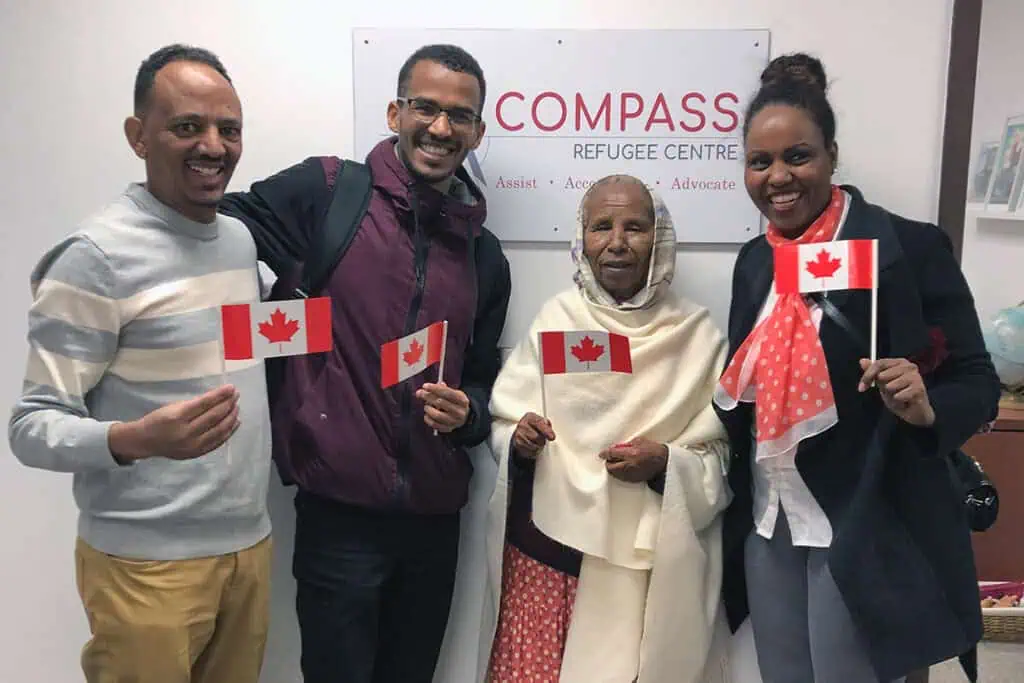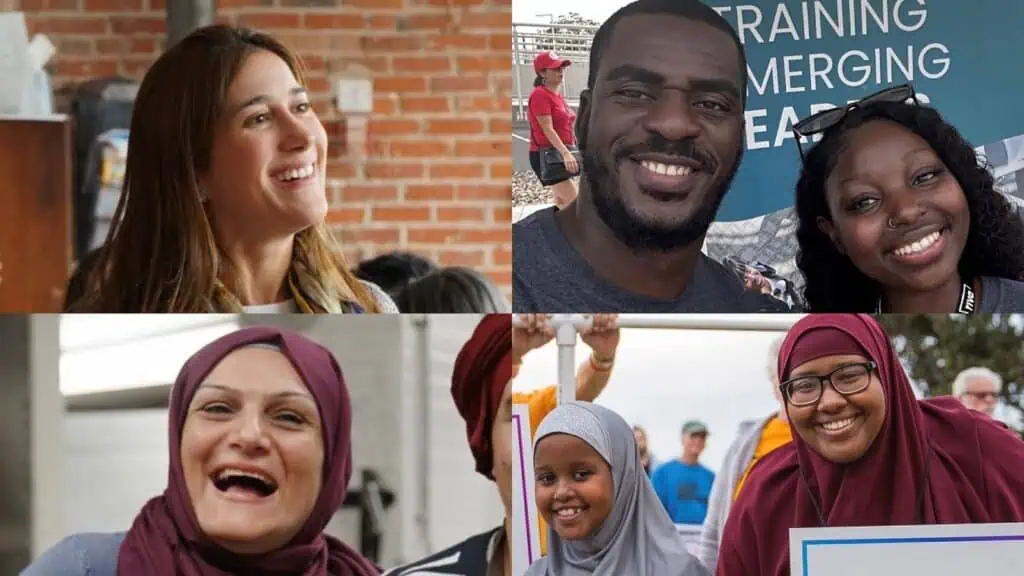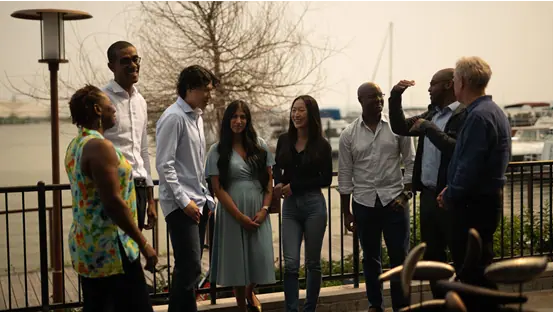Making Digital Learning Accessible to Immigrants and Refugees
Written by the EdTech Center @ World Education, a grantee partner of the WES Mariam Assefa Fund, this blog post explores how the center’s new CrowdED Learning initiative makes more equitable digital learning possible for immigrants and refugees.
COVID-19 sparked an urgency for organizations to increase digital access and inclusion as programs shifted to provide remote services and distance learning. Many immigrant-serving agencies encountered difficulties finding quality, age-appropriate, and linguistically diverse educational resources they could use and adapt.
While COVID-19 amplified the need for quality distance learning options, it also exacerbated a long-standing challenge facing English language instructors: that of locating Open Educational Resources (OER) in multiple languages.
Jose Adorno, a distance learning coordinator in Connecticut, said that bilingual teachers often struggle to find instructional resources in Spanish or other languages, which leads to educators spending excessive time searching for existing quality content and immigrant learners having inconsistent learning experiences with an agency.
Lina Rahme, an English instructor for Teaching Women English, a program in Lebanon, has also experienced this challenge. “I sometimes spent hours recording a video in Arabic for women who are taking basic English courses because I wanted to teach them how to use a new tool that was needed to complete an assignment on how to complete an Excel sheet,” she recounted.
To address this need and make digital learning more accessible and equitable, the CrowdED Learning initiative at World Education Inc. has been developing a content sharing ecosystem to enable immigrant- and refugee-serving organizations to easily find, adapt, and share quality OER content. With additional support from the U.S. Department of Education’s Digital Resilience in the American Workforce project, the EdTech Center @ World Education recently brought together 40 educators in an EdTech Maker Space to expand the center’s open Digital Skills Library of instructional resources. A subset of educators, including Jose, focused on adding resources in other languages.
The EdTech Center team sat down with Jose, Lina, and their group member from the EdTech Maker Space, Andrea Lypka, an e-learning program manager with the Pinellas Education Foundation in Largo, Florida, to hear their insights and reflections on helping to source new content for the platform.
Motivated by the Need to Fill Gaps
Jose, Andrea, and Lina were motivated to volunteer to find, tag, and add quality digital skills content into the new Digital Skills Library in a variety of languages because of the needs they saw. Jose said that it was critical to meet his students “where they are” and build from there.
“Being able to share instructional content in Spanish with my students is a game changer. I can help my students progress in learning new academic or job skills without getting stuck or delayed by a language barrier,” he continued. “I have worked with students that get desperate because their language development has set them back, but being able to teach them new skills in their native language allows them to keep climbing even as they learn English, and then make the language connections and transfer them once they start applying those skills in English.”
Andrea emphasized how, in her work in a Florida multilingual school district, the Digital Skills Library will be a valuable and accessible resource she can share with the students and their families.
“COVID taught us that learning without reliable access to the internet or lack of access to technology or digital literacy skills puts students and families, especially those with diverse backgrounds, at a real disadvantage. The ability to access digital devices, resources, and tools requires the knowledge to use them, and the native language content we’ve added will help.”
Andrea Lypka, e-learning program manager
Andrea is helping to add Romanian and Hungarian activities to the Digital Skills Library but has found it difficult to locate multimodal instructional resources in these languages. She hopes to involve more colleagues in efforts to fill these gaps.
Lina spoke of the hours she spent searching the internet for resources in Arabic to supplement her work teaching adult women. She may have in fact wasted time by creating material from scratch that already existed. Now she can redirect her efforts to collaborate on content with other educators or build out existing resources in the Digital Skills Library.
The Digital Skills Library in Practice
CrowdED Learning is finishing the development of the SkillBlox app, which will enable educators and learners to combine and adapt instructional resources they find into customized learning playlists and share them in flexible ways. By fall of 2022, the Digital Skills Library content will be in SkillBlox along with the library’s existing math resources and content being added in other topics including civics, health literacy, ELL and more. Jose, Andrea, and Lina each have unique plans for how they will leverage the Digital Skills Library and, eventually, SkillBlox, now that the app has diversified with activities in multiple languages.
“I will use the Digital Skills Library to support the e-learning digital skills coaching sessions we provide to families when giving them internet hotspots and laptops to close digital divides,” said Andrea. “I’m excited to create customized learning experiences for families to help onboard them to using specific devices or applications they need to use as parents, including to support their children’s education.”
Lina, who has been teaching English to adult women in Lebanon since 2014, plans to refer these learners to the library now that they can connect more with content in their mother tongue. She will use it in the Teaching Women English entrepreneurship program in which women need to create a business idea and budget plan using spreadsheets and present their idea to the class.
“I sometimes need to send them easy tutorials on how to use Excel, Word, or PowerPoint in order [for them] to learn these skills and complete their assignments, so now I’ll use the library to find tutorials in Arabic at their level,” she said.
This will save Lina time that she would otherwise spend creating tutorials in easy English or in Arabic.
Jose pointed out that the Digital Skills Library “widens the window of opportunity,” removing the burden on learners to know the right person to ask when they need answers to technological questions. Jose believes strongly in the library’s mission and will continue to support this work by submitting more activities and participating in other EdTech Maker Space events, for which his bilingual skills are invaluable. Of the future development of SkillBlox, he says, “The addition of the library to SkillBlox will give me the opportunity to group materials that can be shared more flexibly with students and colleagues.”
These educators represent the “crowd” of CrowdED Learning: educators, organizations, and content providers committed to using OER to increase equity in education. They will continue creating and curating resources in a variety of languages to make resources available in the SkillBlox learning platform that address not just digital skills but also financial education, health education, ELL, and, essentially, anything the “crowd” deems necessary.
They and dozens of diverse immigrant-serving organizations have also contributed through an inclusive design process with pilots and focus groups, offering their ideas to improve the Skillblox platform and make OERmore useful to adult learners. The EdTech Center @ World Education is honored to have people like Jose, Lina, Andrea, and the hundreds of others who now collaborate with us regularly, offering their diverse perspectives and skills to make CrowdED Learning’s tagline “Learning. Everyone.” a reality.
Educators and workforce organizations can join the effort by contributing to the Digital Skills Library using the “Submit a Resource” button, reaching out to us directly to become a CrowdED content partner or sponsor, or receiving a demo of the SkillBlox app.




